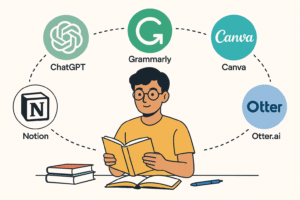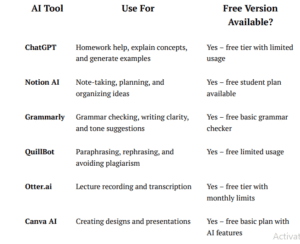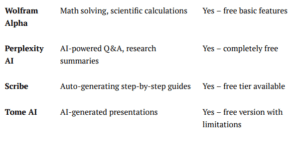 Being a student in 2025 means more pressure and more deadlines—but also smarter solutions. Whether you’re in school or college, free AI tools can help you stay ahead without burning out. From writing essays and summarizing notes to solving math problems and creating presentations, these AI tools for students are your personal study assistants. The best part? Most of them are completely free and
Being a student in 2025 means more pressure and more deadlines—but also smarter solutions. Whether you’re in school or college, free AI tools can help you stay ahead without burning out. From writing essays and summarizing notes to solving math problems and creating presentations, these AI tools for students are your personal study assistants. The best part? Most of them are completely free and
super easy to use. Ready to study smarter with AI? Let’s explore the best AI tools
that every student should know in 2025.
Why Students Need AI Tools More Than Ever in 2025
 These days, students have too much on their plates—assignments, virtual lectures, quizzes, group projects, and internships. AI is now playing the role of digital study mates, assisting learners in tackling their workload with greater concentration and less anxiety.
These days, students have too much on their plates—assignments, virtual lectures, quizzes, group projects, and internships. AI is now playing the role of digital study mates, assisting learners in tackling their workload with greater concentration and less anxiety.
● Time-Saving: AI tools summarize notes, generate answers, and help plan schedules within minutes.
● Innovative Organization: Keep all your thoughts, research, and to-dos in one place.
● 24/7 Help: Unlike tutors, these tools are available 24/7. Consider completing your essay in half the time or summarizing an auto 40-page chapter. That’s what AI can do.
Top 10 Free AI Tools for Students That Work


 1. ChatGPT – The Ultimate Homework Assistant
1. ChatGPT – The Ultimate Homework Assistant
Use-case:
Having ChatGPT at your disposal is akin to having a skilled tutor who is ready to help you at any time of the day. Suppose you’re having difficulties tackling a complex mathematics problem, wrapping your head around explaining a
Science concept, or requiring inspiration for your English essay. In that case, ChatGPT breaks down all boundaries and makes your life easier than ever. If that isn’t enough, you can also rewrite your notes, create plans with them, or
have them set up as a quiz for you. It saves you loads of time for all of your subjects.
🔗 chat.openai.com
Ethical Use Tips:
● Don’t use ChatGPT to get complete answers; request explanations and examples instead.
● Make sure to summarize and rephrase the responses before adding them to your work.
● Think of ChatGPT as an aide to help with studying and not for completing an assignment without any effort.
● Disclose AI assistance wherever your school or teacher has asked you to.
2. Notion AI – Organize Notes and Ideas Effortlessly
Use-case:
Notion AI makes your study area a thinking digital notebook. You can type out your rough ideas, and it converts them into organized notes or to-do lists. It is ideal for keeping your syllabus, projects, or revision plans organized.
Students are entitled to a complimentary Notion Plus plan with a valid email.
🔗 notion. So
Ethical Use Tips
● Employ Notion AI to aid in structuring notes and planning activities, but add your comprehension.
● Avoid using AI summary features as the only source of information; revise and enrich your notes freely.
● Use AI-generated outlines as templates for your thoughts.
● Be truthful about AI assistance in any individual or group work prepared for submission.
3. Grammarly – Make Your Writing Error-Free
Use-case:
Grammarly is your writing companion. You type an essay or an email, and it proofreads for grammar, spelling, readability, and even tone. It is excellent for sounding professional in assignments without putting in extra effort.
Students can use the free account or pay for premium feedback.
🔗 grammarly.com
Ethical Use Tips
● Do not use Grammarly to rewrite entire essays; its purpose is to improve tone and fix grammar.
● Make sure you go through all the suggestions and apply your edits.
● Never trust that AI’s suggestions will be written in your style; use your judgment.
● Think of Grammarly as a writing coach and not a content generator.
4. QuillBot – Paraphrase Without Plagiarism
Use-case:
QuillBot assists students in rephrasing content in a more intelligent manner—ideal for comprehending text, preventing plagiarism, or condensing muddled paragraphs. It also has a grammar check and summary feature. Just
copy and paste your content and select the tone or style you prefer.
🔗 quillbot.com
Ethical Use Tips
● To paraphrase, use QuillBot, but as a rule of thumb, ensure that you comprehend what you are writing.
● Do not use it to simply alter phrases without fully comprehending the content – this is a type of plagiarism.
● Use it to expand your learning experience and know how to frame ideas.
● Pair your critical thinking and research with AI paraphrasing.
5. Otter.ai – Record and Transcribe Lectures Automatically
Use-case:
Otter.ai is a sanity-saver for long classes. It listens, records, and transcribes spoken lectures verbatim into text notes in real-time. You can highlight, search, and even share these transcriptions. This is great for students who prefer to review audio afterward or miss a portion of the class.
🔗 otter.ai
Ethical Use Tips
● With Otter.ai, you can easily transcribe lectures and pay attention to learning the material.
● Edit every transcript because AI transcription is imperfect.
● You are supposed to engage actively in class. Thus, transcripts should never be a substitute for active note-taking.
● Don’t try to substitute class attendance or assignments with this tool; instead, use it to enable you to study more wisely.
6. Canva AI – Create Stunning Designs & Presentations
Use-case:
Need a last-minute presentation? Canva’s AI-driven “Magic Design” helps you make professional slides, posters, and social media graphics in minutes. Just enter what you need, and Canva will design it for you. Perfect for class
projects and portfolios.
🔗 canva.com
Ethical Use Tips
● Design presentations and visuals using your research and content using Canva AI.
● Don’t plagiarize—customize to ensure it’s your design.
● Using an original idea, accomplish your project creatively with Canvas functionality.
● Where applicable, credit Canva for any resources or images incorporated.
7. Wolfram Alpha – Solve Math Like a Pro
Use-case:
Wolfram Alpha doesn’t provide simple answers—it reveals step-by-step solutions to math, physics, and chemistry problems. Teachers rely on it, and it’s perfect for homework assistance or studying for exams.
🔗 wolframalpha.com
Ethical Use Tips
● Check mathematical equations and scientific calculations using Wolfram Alpha, but always attempt the problems on your own first.
● Use the tool to verify your calculations and see how the answers were reached.
● Without first going through the steps, do not claim the solutions provided by Wolfram as your work.
● Incorporate the answers given by AI with personal calculations done beforehand.
● Don’t over-rely on AI to answer your questions. Instead, direct your efforts towards developing critical thinking to analyze yourself.
● Take AI responses as a template and build upon them for further analysis and investigation.
● Verify the facts you’ve obtained before utilizing them for your assignment.
9. Scribe – Turn Any Task into a Step-by-Step Guide
Use-case:
Scribe records your screen when you’re working on a task and constructs a step-by-step visual guide automatically. It’s ideal for creating tutorials, recording workflows, or learning how to do something once and never having to remember it again.
🔗 scribehow.com
Ethical Use Tips
● Employ a Scribe to document processes you know through creating step-by-step descriptions.
● Do not use AI-generated assignments as workflows if you have not been trained on them.
● Personalize AI-created guides by including your distinct perspectives.
● Use it as a method to help others while reinforcing your knowledge.
10. Tome AI – Presentations Made in Seconds
Use-case:
Tome AI creates beautiful animated slides from just one line of text. For instance, “Make a 5-slide deck on climate change” will generate a full presentation in mere seconds, including images, text, and design. It works great for students who are pressed for time.
🔗 tome.app
Ethical Use Tips
● The voice and insights remain yours, yet the presentation is AI-generated using Tome AI.
● Be prepared to elaborate deeply on topics beyond what is covered in the AI
FAQs – What Students Are Asking About AI Tools in 2025
 Q1: What are the best free AI tools for students in 2025?
Q1: What are the best free AI tools for students in 2025?
ChatGPT, Notion AI, and Grammarly are my top three tools. Why? Because they are like your virtual assistant friends: ChatGPT helps break down complex concepts, Notion organizes your notes and manages your life, and Grammarly corrects your work and ensures it’s written well. Plus, all these tools provide adequate free plans
for students.
Q2: Can students use ChatGPT for homework?
Yes, and a lot of students do! But here’s the deal: use ChatGPT to understand things, not just copy answers. You can ask it to explain a topic, rewrite your rough draft, or even quiz you. Just don’t paste AI answers into your assignments — that’s where schools draw the line. Think of it like a study buddy, not a shortcut.
Q3: Which AI tool helps with essays and writing?
If writing essays is overly stressful for you, look into Grammarly, QuillBot, or Jenni AI. Grammarly makes sure your grammar and tone are on point, while QuillBot ensures that you will not be flagged for plagiarism because it paraphrases while retaining the original meaning. Jenni AI assists you with beginning an essay or organizing it when you experience writer’s block. You still have to do the work, but they make it easier for you.
Q4: Are AI tools allowed in college?
Colleges tend to accept the use of AI tools, provided that you are utilizing them ethically. You are permitted to use AI to help polish your writing, hand in notes, or assist in brainstorming. Just make sure you don’t submit work you didn’t compose or comprehend. If in doubt, consult your professor or your syllabus before proceeding.
Q5: How can I take notes using AI?
If lectures feel disorganized and hard to follow, AI can be your sidekick. Otter.ai can record and transcribe your lectures, so your only task is listening. AI Notion helps you tidy your notes into outlined sections and clearly labeled lists of functions. If you prefer everything summarized, Mindgrasp does that and more; it adds bullet points like a knowledgeable companion.
Final Thoughts: Study Smarter, Not Harder with AI
Being a student in 2025 can feel overwhelming — so many tasks, so little time. But here’s the good news: AI tools are like your personal study buddies, helping you work smarter without burning out. Whether it’s ChatGPT explaining tough concepts, Notion AI organizing your chaos, or Grammarly polishing your writing — these tools are here to support your learning, not replace it. Start with just 2 or 3 tools that fit your needs. Explore hidden gems like Perplexity, Scribe, or Tome. Most importantly, use AI ethically — for understanding, not copy-pasting.
These tools won’t take the test for you, but they’ll make the journey a whole lot easier.
👉Comment below which AI tool has helped you the most — let’s learn from each other!
In the end, success in 2025 isn’t about doing it all alone. It’s about using the right tools to lift the load.

